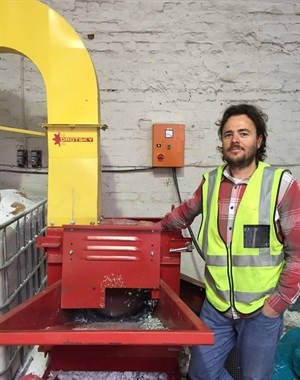According to Polystyrene Packaging Council director Adri Spangenberg, the reprocessing of expanded and high impact polystyrene has increased by 106% between the period 2013 and 2015 in South Africa owing to the fact that more end-markets were developed and knowledge of the fact that the material can successfully be reused in various different applications, continued to grow.

Polystyrene Packaging Council director Adri Spangenberg
“We are still awaiting the official recycling figures for 2016, but early indications show that approximately 3,600-tons of recycled polystyrene were added to the traditional recycling figures – making this our best year to date,” Spangenberg says.
Successfully recovering polystyrene
“We have managed to prove that polystyrene can successfully be recovered from households and industries by working closely with waste management companies and municipalities. Moreover, our recycling projects are undoubtedly successful and yet another proof that South Africa is a truly unique country. We may be small, but we have our own way of doing things and have an ability to find solutions to problems that the rest of the world might find insurmountable,” she says.
Polystyrene is widely being used by spaza shops, take-away vendors, cafeterias and supermarkets around the country due to the fact that it insulates food and beverages, protects food and contents, is cost-effective, lightweight and convenient.
Although it is a single-use plastic item, it gets recycled into items that continue to improve lives and create jobs in a variety of different industries, ranging from building and construction, to picture frames, cornices and home décor, clothing hangers and stationery.
Lightweight concrete

Hilton Cowie
“Last year alone, 2,036-tons of polystyrene were successfully recycled for use in lightweight concrete through our Project Build,” Spangeberg says. Hilton Cowie of Greenlite Concrete in Cape Town and Hennie Snyman of the Get Connected Group in Gauteng were the two biggest projects the PSPC currently supports, and uses recycled, post-consumer polystyrene for large commercial and residential construction projects around the country.
“We needed to have hammermills installed at both these premises last year in order to assist with the processing of the large volumes of polystyrene that are required for their construction projects. These mills are capable of pelletising 150kg of expanded polystyrene per hour in order to keep up with the demand,” she explains.
Another area that has seen impressive growth in the amount of recycled polystyrene it used, was the home décor market. More than 1,377-tons of expanded and high impact polystyrene were recycled last year for use in picture frames, cornices and curtain rods through the PSPC’s Project Dècor.
“Apart from the fact that it helped divert polystyrene from landfill, we are particularly pleased that this is another market where jobs and products were manufactured locally as opposed to relying on cheap imports from the Far East that have a detrimental impact on our own markets,” Spangenberg adds.
Plastic worth much more than original purpose
Looking ahead at 2017, the PSPC will continue to promote the use and the recycling of polystyrene to South Africans of all walks of life. “The Davos World Economic Forum gathering released their report last week in which they called for strategies to dramatically increase recycling of plastic packaging — from the current 14% to 70%. So, whether you are an avid gardener who gets your plants from seedling trays, a business person getting your morning coffee from the work’s canteen or a miner enjoying your afternoon lunch from the cafeteria, the polystyrene you use should be recycled.
"Plastic is worth much more than its original purpose when used in infrastructure applications. For this reason, we believe that polystyrene should be re-used and recycled into building projects that will benefit many generations to come. Our polystyrene recycling projects not only touch lives and improve communities, but are also key to reclaiming useful carbons and a valuable resource that would otherwise have been lost. Polystyrene recycling helps to create jobs, opportunities and innovative new products in a true, circular economy model,” Spangenberg concludes.



















































